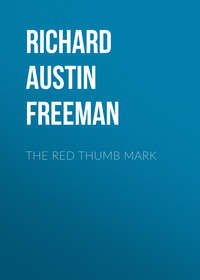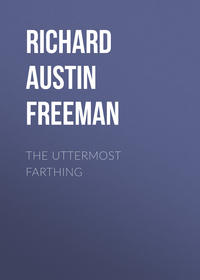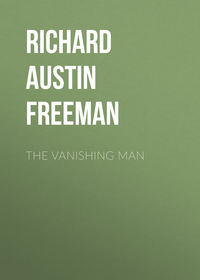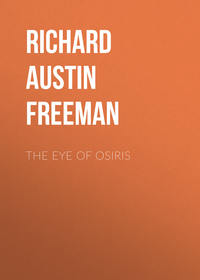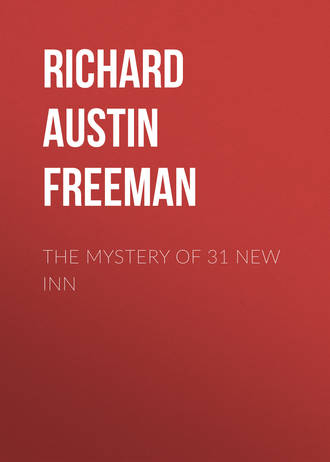 полная версия
полная версияThe Mystery of 31 New Inn
At length he looked up at me. "This is a very extraordinary affair, Jervis," he said.
"Very," I agreed; "and the question that is agitating me is, what is to be done?"
"Yes," he said, meditatively, "that is the question; and an uncommonly difficult question it is. It really involves the settlement of the antecedent question: What is it that is happening at that house?"
"What do you think is happening at that house?" I asked.
"We must go slow, Jervis," he replied. "We must carefully separate the legal tissues from the medical, and avoid confusing what we know with what we suspect. Now, with reference to the medical aspects of the case. The first question that confronts us is that of sleeping sickness, or negro-lethargy as it is sometimes called; and here we are in a difficulty. We have not enough knowledge. Neither of us, I take it, has ever seen a case, and the extant descriptions are inadequate. From what I know of the disease, its symptoms agree with those in your case in respect of the alleged moroseness and in the gradually increasing periods of lethargy alternating with periods of apparent recovery. On the other hand, the disease is said to be confined to negroes; but that probably means only that negroes alone have hitherto been exposed to the conditions that produce it. A more important fact is that, as far as I know, extreme contraction of the pupils is not a symptom of sleeping sickness. To sum up, the probabilities are against sleeping sickness, but with our insufficient knowledge, we cannot definitely exclude it."
"You think that it may really be sleeping sickness?"
"No; personally I do not entertain that theory for a moment. But I am considering the evidence apart from our opinions on the subject. We have to accept it as a conceivable hypothesis that it may be sleeping sickness because we cannot positively prove that it is not. That is all. But when we come to the hypothesis of morphine poisoning, the case is different. The symptoms agree with those of morphine poisoning in every respect. There is no exception or disagreement whatever. The common sense of the matter is therefore that we adopt morphine poisoning as our working diagnosis; which is what you seem to have done."
"Yes. For purposes of treatment."
"Exactly. For medical purposes you adopted the more probable view and dismissed the less probable. That was the reasonable thing to do. But for legal purposes you must entertain both possibilities; for the hypothesis of poisoning involves serious legal issues, whereas the hypothesis of disease involves no legal issues at all."
"That doesn't sound very helpful," I remarked.
"It indicates the necessity for caution," he retorted.
"Yes, I see that. But what is your own opinion of the case?"
"Well," he said, "let us consider the facts in order. Here is a man who, we assume, is under the influence of a poisonous dose of morphine. The question is, did he take that dose himself or was it administered to him by some other person? If he took it himself, with what object did he take it? The history that was given to you seems completely to exclude the idea of suicide. But the patient's condition seems equally to exclude the idea of morphinomania. Your opium-eater does not reduce himself to a state of coma. He usually keeps well within the limits of the tolerance that has been established. The conclusion that emerges is, I think, that the drug was administered by some other person; and the most likely person seems to be Mr. Weiss."
"Isn't morphine a very unusual poison?"
"Very; and most inconvenient except in a single, fatal dose, by reason of the rapidity with which tolerance of the drug is established. But we must not forget that slow morphine poisoning might be eminently suitable in certain cases. The manner in which it enfeebles the will, confuses the judgment and debilitates the body might make it very useful to a poisoner whose aim was to get some instrument or document executed, such as a will, deed or assignment. And death could be produced afterwards by other means. You see the important bearing of this?"
"You mean in respect of a death certificate?"
"Yes. Suppose Mr. Weiss to have given a large dose of morphine. He then sends for you and throws out a suggestion of sleeping sickness. If you accept the suggestion he is pretty safe. He can repeat the process until he kills his victim and then get a certificate from you which will cover the murder. It was quite an ingenious scheme—which, by the way, is characteristic of intricate crimes; your subtle criminal often plans his crime like a genius, but he generally executes it like a fool—as this man seems to have done, if we are not doing him an injustice."
"How has he acted like a fool?"
"In several respects. In the first place, he should have chosen his doctor. A good, brisk, confident man who 'knows his own mind' is the sort of person who would have suited him; a man who would have jumped at a diagnosis and stuck to it; or else an ignorant weakling of alcoholic tendencies. It was shockingly bad luck to run against a cautious scientific practitioner like my learned friend. Then, of course, all this secrecy was sheer tomfoolery, exactly calculated to put a careful man on his guard; as it has actually done. If Mr. Weiss is really a criminal, he has mismanaged his affairs badly."
"And you apparently think that he is a criminal?"
"I suspect him deeply. But I should like to ask you one or two questions about him. You say he spoke with a German accent. What command of English had he? Was his vocabulary good? Did he use any German idioms?"
"No. I should say that his English was perfect, and I noticed that his phrases were quite well chosen even for an Englishman."
"Did he seem to you 'made up' in any way; disguised, I mean?"
"I couldn't say. The light was so very feeble."
"You couldn't see the colour of his eyes, for instance?"
"No. I think they were grey, but I couldn't be sure."
"And as to the coachman. He wore a wig, you said. Could you see the colour of his eyes? Or any peculiarity by which you could recognize him?"
"He had a malformed thumb-nail on his right hand. That is all I can say about him."
"He didn't strike you as resembling Weiss in any way; in voice or features?"
"Not at all; and he spoke, as I told you, with a distinct Scotch accent."
"The reason I ask is that if Weiss is attempting to poison this man, the coachman is almost certain to be a confederate and might be a relative. You had better examine him closely if you get another chance."
"I will. And that brings me back to the question, What am I to do? Ought I to report the case to the police?"
"I am inclined to think not. You have hardly enough facts. Of course, if Mr. Weiss has administered poison 'unlawfully and maliciously' he has committed a felony, and is liable under the Consolidation Acts of 1861 to ten years' penal servitude. But I do not see how you could swear an information. You don't know that he administered the poison—if poison has really been administered—and you cannot give any reliable name or any address whatever. Then there is the question of sleeping sickness. You reject it for medical purposes, but you could not swear, in a court of law, that this is not a case of sleeping sickness."
"No," I admitted, "I could not."
"Then I think the police would decline to move in the matter, and you might find that you had raised a scandal in Dr. Stillbury's practice to no purpose."
"So you think I had better do nothing in the matter?"
"For the present. It is, of course, a medical man's duty to assist justice in any way that is possible. But a doctor is not a detective; he should not go out of his way to assume police functions. He should keep his eyes and ears open, and, though, in general, he should keep his own counsel, it is his duty to note very carefully anything that seems to him likely to bear on any important legal issues. It is not his business officiously to initiate criminal inquiries, but it is emphatically his business to be ready, if called upon, to assist justice with information that his special knowledge and opportunities have rendered accessible to him. You see the bearing of this?"
"You mean that I should note down what I have seen and heard and say nothing about it until I am asked."
"Yes; if nothing further happens. But if you should be sent for again, I think it is your duty to make further observations with a view, if necessary, to informing the police. It may be, for instance, of vital importance to identify the house, and it is your duty to secure the means of doing so."
"But, my dear Thorndyke," I expostulated, "I have told you how I was conveyed to the house. Now, will you kindly explain to me how a man, boxed up in a pitch-dark carriage, is going to identify any place to which he may be carried?"
"The problem doesn't appear to me to present any serious difficulties," he replied.
"Doesn't it?" said I. "To me it looks like a pretty solid impossibility. But what do you suggest? Should I break out of the house and run away up the street? Or should I bore a hole through the shutter of the carriage and peep out?"
Thorndyke smiled indulgently. "The methods proposed by my learned friend display a certain crudity inappropriate to the character of a man of science; to say nothing of the disadvantage of letting the enemy into our counsels. No, no, Jervis; we can do something better than that. Just excuse me for a minute while I run up to the laboratory."
He hurried away to Polton's sanctum on the upper floor, leaving me to speculate on the method by which he proposed that a man should be enabled, as Sam Weller would express it, "to see through a flight of stairs and a deal door"; or, what was equally opaque, the wooden shutters of a closed carriage.
"Now," he said, when he returned a couple of minutes later with a small, paper-covered notebook in his hand, "I have set Polton to work on a little appliance that will, I think, solve our difficulty, and I will show you how I propose that you should make your observations. First of all, we have to rule the pages of this book into columns."
He sat down at the table and began methodically to rule the pages each into three columns, two quite narrow and one broad. The process occupied some time, during which I sat and watched with impatient curiosity the unhurried, precise movements of Thorndyke's pencil, all agog to hear the promised explanation. He was just finishing the last page when there came a gentle tap at the door, and Polton entered with a satisfied smile on his dry, shrewd-looking face and a small board in his hand.
"Will this do, sir?" he asked.
As he spoke he handed the little board to Thorndyke, who looked at it and passed it to me.
"The very thing, Polton," my friend replied. "Where did you find it? It's of no use for you to pretend that you've made it in about two minutes and a half."
Polton smiled one of his queer crinkly smiles, and remarking that "it didn't take much making," departed much gratified by the compliment.
"What a wonderful old fellow that is, Jervis," Thorndyke observed as his factotum retired. "He took in the idea instantly and seems to have produced the finished article by magic, as the conjurers bring forth rabbits and bowls of goldfish at a moment's notice. I suppose you see what your modus operandi is to be?"
I had gathered a clue from the little appliance—a plate of white fret-wood about seven inches by five, to one corner of which a pocket-compass had been fixed with shellac—but was not quite clear as to the details of the method.
"You can read a compass pretty quickly, I think?" Thorndyke said.
"Of course I can. Used we not to sail a yacht together when we were students?"
"To be sure we did; and we will again before we die. And now as to your method of locating this house. Here is a pocket reading-lamp which you can hook on the carriage lining. This notebook can be fixed to the board with an india-rubber band—thus. You observe that the thoughtful Polton has stuck a piece of thread on the glass of the compass to serve as a lubber's line. This is how you will proceed. As soon as you are locked in the carriage, light your lamp—better have a book with you in case the light is noticed—take out your watch and put the board on your knee, keeping its long side exactly in a line with the axis of the carriage. Then enter in one narrow column of your notebook the time, in the other the direction shown by the compass, and in the broad column any particulars, including the number of steps the horse makes in a minute. Like this."
He took a loose sheet of paper and made one or two sample entries on it in pencil, thus—
"9.40. S.E. Start from home.
9.41 S.W. Granite setts.
9.43. S.W. Wood pavement. Hoofs 104.
9.47. W. by S Granite crossing. Macadam—
and so on. Note every change of direction, with the time; and whenever you hear or feel anything from outside, note it, with the time and direction; and don't forget to note any variations in the horse's pace. You follow the process?"
"Perfectly. But do you think the method is accurate enough to fix the position of a house? Remember, this is only a pocket-compass with no dial, and it will jump frightfully. And the mode of estimating distance is very rough."
"That is all perfectly true," Thorndyke answered. "But you are overlooking certain important facts The track-chart that you will produce can be checked by other data. The house, for instance, has a covered way by which you could identify it if you knew approximately where to look for it. Then you must remember that your carriage is not travelling over a featureless plain. It is passing through streets which have a determined position and direction and which are accurately represented on the ordnance map. I think, Jervis, that, in spite of the apparent roughness of the method, if you make your observations carefully, we shall have no trouble in narrowing down the inquiry to a quite small area. If we get the chance, that is to say."
"Yes, if we do. I am doubtful whether Mr. Weiss will require my services again, but I sincerely hope he will. It would be rare sport to locate his secret burrow, all unsuspected. But now I must really be off."
"Good-bye, then," said Thorndyke, slipping a well-sharpened pencil through the rubber band that fixed the notebook to the board. "Let me know how the adventure progresses—if it progresses at all—and remember, I hold your promise to come and see me again quite soon in any case."
He handed me the board and the lamp, and, when I had slipped them into my pocket, we shook hands and I hurried away, a little uneasy at having left my charge so long.
Chapter III
"A Chiel's Amang Ye Takin' Notes"The attitude of the suspicious man tends to generate in others the kind of conduct that seems to justify his suspicions. In most of us there lurks a certain strain of mischief which trustfulness disarms but distrust encourages. The inexperienced kitten which approaches us confidingly with arched back and upright tail, soliciting caresses, generally receives the gentle treatment that it expects; whereas the worldly-wise tom-cat, who, in response to friendly advances, scampers away and grins at us suspiciously from the fancied security of an adjacent wall, impels us to accelerate his retreat with a well-directed clod.
Now the proceedings of Mr. H. Weiss resembled those of the tom-cat aforesaid and invited an analogous reply. To a responsible professional man his extraordinary precautions were at once an affront and a challenge. Apart from graver considerations, I found myself dwelling with unholy pleasure on the prospect of locating the secret hiding-place from which he seemed to grin at me with such complacent defiance; and I lost no time and spared no trouble in preparing myself for the adventure. The very hansom which bore me from the Temple to Kennington Lane was utilized for a preliminary test of Thorndyke's little apparatus. During the whole of that brief journey I watched the compass closely, noted the feel and sound of the road-material and timed the trotting of the horse. And the result was quite encouraging. It is true that the compass-needle oscillated wildly to the vibration of the cab, but still its oscillations took place around a definite point which was the average direction, and it was evident to me that the data it furnished were very fairly reliable. I felt very little doubt, after the preliminary trial, as to my being able to produce a moderately intelligible track-chart if only I should get an opportunity to exercise my skill.
But it looked as if I should not. Mr. Weiss's promise to send for me again soon was not fulfilled. Three days passed and still he made no sign. I began to fear that I had been too outspoken; that the shuttered carriage had gone forth to seek some more confiding and easy-going practitioner, and that our elaborate preparations had been made in vain. When the fourth day drew towards a close and still no summons had come, I was disposed reluctantly to write the case off as a lost opportunity.
And at that moment, in the midst of my regrets, the bottle-boy thrust an uncomely head in at the door. His voice was coarse, his accent was hideous, and his grammatical construction beneath contempt; but I forgave him all when I gathered the import of his message.
"Mr. Weiss's carriage is waiting, and he says will you come as quickly as you can because he's took very bad to-night."
I sprang from my chair and hastily collected the necessaries for the journey. The little board and the lamp I put in my overcoat pocket; I overhauled the emergency bag and added to its usual contents a bottle of permanganate of potassium which I thought I might require. Then I tucked the evening paper under my arm and went out.
The coachman, who was standing at the horse's head as I emerged, touched his hat and came forward to open the door.
"I have fortified myself for the long drive, you see," I remarked, exhibiting the newspaper as I stepped into the carriage.
"But you can't read in the dark," said he.
"No, but I have provided myself with a lamp," I replied, producing it and striking a match.
He watched me as I lit the lamp and hooked it on the back cushion, and observed:
"I suppose you found it rather a dull ride last time. It's a longish way. They might have fitted the carriage with an inside lamp. But we shall have to make it a quicker passage to-night. Governor says Mr. Graves is uncommon bad."
With this he slammed the door and locked it. I drew the board from my pocket, laid it on my knee, glanced at my watch, and, as the coachman climbed to his seat, I made the first entry in the little book.
"8.58. W. by S. Start from home. Horse 13 hands."
The first move of the carriage on starting was to turn round as if heading for Newington Butts, and the second entry accordingly read:
"8.58.30. E. by N."
But this direction was not maintained long. Very soon we turned south and then west and then south again. I sat with my eyes riveted on the compass, following with some difficulty its rapid changes. The needle swung to and fro incessantly but always within a definite arc, the centre of which was the true direction. But this direction varied from minute to minute in the most astonishing manner. West, south, east, north, the carriage turned, "boxing" the compass until I lost all count of direction. It was an amazing performance. Considering that the man was driving against time on a mission of life and death urgency, his carelessness as to direction was astounding. The tortuousness of the route must have made the journey twice as long as it need have been with a little more careful selection. At least so it appeared to me, though, naturally, I was not in a position to offer an authoritative criticism.
As far as I could judge, we followed the same route as before. Once I heard a tug's whistle and knew that we were near the river, and we passed the railway station, apparently at the same time as on the previous occasion, for I heard a passenger train start and assumed that it was the same train. We crossed quite a number of thoroughfares with tram-lines—I had no idea there were so many—and it was a revelation to me to find how numerous the railway arches were in this part of London and how continually the nature of the road-metal varied.
It was by no means a dull journey this time. The incessant changes of direction and variations in the character of the road kept me most uncommonly busy; for I had hardly time to scribble down one entry before the compass-needle would swing round sharply, showing that we had once more turned a corner; and I was quite taken by surprise when the carriage slowed down and turned into the covered way. Very hastily I scribbled down the final entry ("9.24. S.E. In covered way"), and having closed the book and slipped it and the board into my pocket, had just opened out the newspaper when the carriage door was unlocked and opened, whereupon I unhooked and blew out the lamp and pocketed that too, reflecting that it might be useful later.
As on the last occasion, Mrs. Schallibaum stood in the open doorway with a lighted candle. But she was a good deal less self-possessed this time. In fact she looked rather wild and terrified. Even by the candle-light I could see that she was very pale and she seemed unable to keep still. As she gave me the few necessary words of explanation, she fidgeted incessantly and her hands and feet were in constant movement.
"You had better come up with me at once," she said. "Mr. Graves is much worse to-night. We will wait not for Mr. Weiss."
Without waiting for a reply she quickly ascended the stairs and I followed. The room was in much the same condition as before. But the patient was not. As soon as I entered the room, a soft, rhythmical gurgle from the bed gave me a very clear warning of danger. I stepped forward quickly and looked down at the prostrate figure, and the warning gathered emphasis. The sick man's ghastly face was yet more ghastly; his eyes were more sunken, his skin more livid; "his nose was as sharp as a pen," and if he did not "babble of green fields" it was because he seemed to be beyond even that. If it had been a case of disease, I should have said at once that he was dying. He had all the appearance of a man in articulo mortis. Even as it was, feeling convinced that the case was one of morphine poisoning, I was far from confident that I should be able to draw him back from the extreme edge of vitality on which he trembled so insecurely.
"He is very ill? He is dying?"
It was Mrs. Schallibaum's voice; very low, but eager and intense. I turned, with my finger on the patient's wrist, and looked into the face of the most thoroughly scared woman I have ever seen. She made no attempt now to avoid the light, but looked me squarely in the face, and I noticed, half-unconsciously, that her eyes were brown and had a curious strained expression.
"Yes," I answered, "he is very ill. He is in great danger."
She still stared at me fixedly for some seconds. And then a very odd thing occurred. Suddenly she squinted—squinted horribly; not with the familiar convergent squint which burlesque artists imitate, but with external or divergent squint of extreme near sight or unequal vision. The effect was quite startling. One moment both her eyes were looking straight into mine; the next, one of them rolled round until it looked out of the uttermost corner, leaving the other gazing steadily forward.
She was evidently conscious of the change, for she turned her head away quickly and reddened somewhat. But it was no time for thoughts of personal appearance.
"You can save him, doctor! You will not let him die! He must not be allowed to die!"
She spoke with as much passion as if he had been the dearest friend that she had in the world, which I suspected was far from being the case. But her manifest terror had its uses.
"If anything is to be done to save him," I said, "it must be done quickly. I will give him some medicine at once, and meanwhile you must make some strong coffee."
"Coffee!" she exclaimed. "But we have none in the house. Will not tea do, if I make it very strong?"
"No, it will not. I must have coffee; and I must have it quickly."
"Then I suppose I must go and get some. But it is late. The shops will be shut. And I don't like leaving Mr. Graves."


